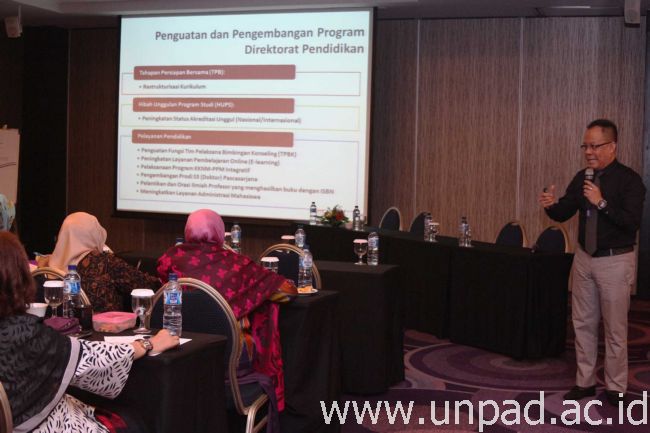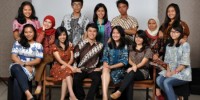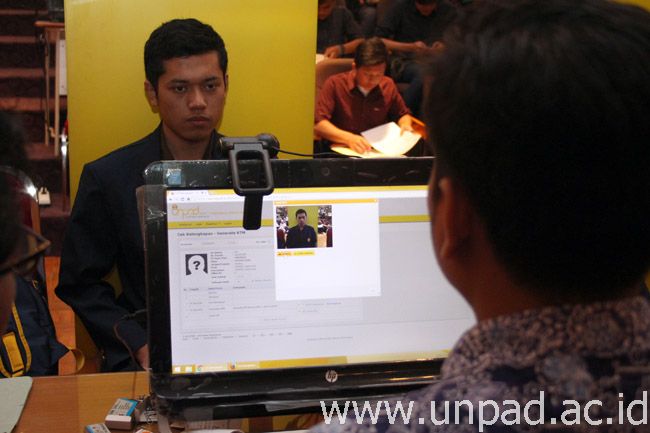[Unpad.ac.id, 3/03/2016] Starting on 2016/2017 academic year, Universitas Padjadjaran will apply Joint Preparation Program (TPB) for new undergraduate students. All new students from all study programs in Unpad will be enrolled in this program at their first year of study (First and Second Semester).

Director of Education Unpad, Prof. Dr. Budi Setiabudiawan, dr., Sp.A-K., M.Kes., said that TPB program will include three activities, curricular, co-curricular, and extracurricular activities. Curricular activities are joint lectures during the first semester, while co-curricular activities involve development of character and lecture of sports, art, and creativity extracurricular. Co-curricular activities and extracurricular activities will continue until the second semester.
“TPB is expected to produce desirable graduates according to Principal Scientific Pattern of Unpad,” said Prof. Budi during the introduction for the Workshop Preparation of Learning Outcome (LO), Semester Lesson Plan (RPS), and Joint Preparation Program Module (TPB), Thursday (3/03) at Hotel Aston Primera, Bandung.
Furthermore, Prof. Budi elaborated the importance of the application of TPB for new students. This refers to model of student development stages developed by Prof. Dr. Juke Roosjati Siregar, M.Pd., a Professor at Faculty of Psychology Unpad of the introduction, development, and release of Students (P3M).
In these methods, new student are in transition stage between high school with university. Prof. Juke categorized the first and second semester students as introduction phase, therefore the course must be directed at the introduction of self, , environment, and university.
“We must accompany them from being a teenager into young adult that we desire. That means we need to manage this transitional period well, “said Prof. Budi.
Prof. Budi highlighted two conditions causing the urgency of TPB planning: the lack of a sense of Unpad-ness in all the students and the low rate of on-time study completion. These conditions should be improved in early stage, as soon as students begin their first year.
Technically, TPB will incorporate new students from the entire study course to take classes together. The material of curricular activities TPB will include General Courses (MKU), Course Cluster, Program Study Courses, Unpad Courses (the concept of Natural Science Basic [IAD] and Social Sciences Cultural Basic [ISBD]), as well as the skills of Learning and Information Literacy (KLBI).
According to Prof. Budi, MKU included state-mandated courses, including Pancasila, Citizenship, Indonesian, Religious Education, as well as English. Each class MKU will be 40-50 students of the mixed courses.
By quota plan of Unpad new undergraduate students ranging from 6,000 students, there would be 120 MKU classes, of 60 morning classes and 60 afternoon classes. 60 lecturers will teach the lectures on Mondays and Wednesdays.
“Later, new students would not be managed by each study program at the beginning, but will be managed by the TPB,” said Prof. Budi.
MKK as lecture program adapted to scientific cluster in Unpad was divided into groups of Health, Agro-complex, Socio-humanities, Science Technology and Environment and Development. New students are grouped by their science clusters and given intersecting subjects or material learned by students in some faculties of one cluster.
Meanwhile, according to Prof. Budi, Study Program Course was introduction of subjects that are delivered by the study program. In this course, students are grouped according to the respective study programs.
Unpad Courses were all subjects that will be delivered by Professors. At the class of Learning and Information Literacy skills, students were given technological mastery of information literacy skills for one semester.
“After students completed TPB and entered Program Study, their base of knowledge is uniform,” said Prof. Budi.
One of Unpad TPB Ad hoc team Nono Carsono, SP, M.Sc., PhD., said that the number of credits for the MKU Religion, Pancasila and Citizenship are 3 Credits, MKU English 2 credits, MKU IAD and ISBD 2 credits. MKK would range between 10-12 credits, while KBLI 1 credit, and sports and art is 1 Credit.
MKK’s lecture will be held on Tuesday and Thursday, while co-curricular and extracurricular activities will be held on Friday and Saturday.*
Reported by Arief Maulana / eh


